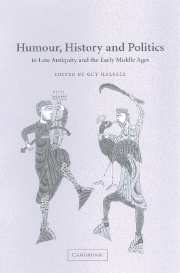Book contents
- Frontmatter
- Contents
- Notes on contributors
- Preface
- List of abbreviations
- Introduction: ‘Don't worry, I've got the key’
- PART I THE FATE OF HUMOROUS WRITING
- PART II HUMOUR AND THE POLITICS OF DIFFERENCE
- 3 The lexicon of abuse: drunkenness and political illegitimacy in the late Roman world
- 4 Funny foreigners: laughing with the barbarians in late antiquity
- 5 Liutprand of Cremona's sense of humour
- PART III HUMOUR, HISTORY AND POLITICS IN THE CAROLINGIAN WORLD
- Index
4 - Funny foreigners: laughing with the barbarians in late antiquity
Published online by Cambridge University Press: 24 July 2009
- Frontmatter
- Contents
- Notes on contributors
- Preface
- List of abbreviations
- Introduction: ‘Don't worry, I've got the key’
- PART I THE FATE OF HUMOROUS WRITING
- PART II HUMOUR AND THE POLITICS OF DIFFERENCE
- 3 The lexicon of abuse: drunkenness and political illegitimacy in the late Roman world
- 4 Funny foreigners: laughing with the barbarians in late antiquity
- 5 Liutprand of Cremona's sense of humour
- PART III HUMOUR, HISTORY AND POLITICS IN THE CAROLINGIAN WORLD
- Index
Summary
INCONGRUITY: THE HUMOUR OF THE INAPPROPRIATE
In the 1980s and 1990s, the cartoons of Gary Larson became very popular on both sides of the Atlantic; indeed Larson's work, ‘The Far Side’, has a special relevance to early medievalists, as Vikings were a favourite topic. One thing that makes Larson's cartoons amusing is his knack of setting familiar things in inappropriate settings or circumstances. The people (or animals, or amoebas) are rarely saying or doing anything – in itself – especially amusing. What makes us laugh is, simply enough, the idea of serious, intellectually brilliant nuclear physicists playing school-yard pranks on each other, cows playing ‘knock on the door and run’ with the farmer, and so on. Similarly, in the earlier 1990s in Britain, whilst Larson's archaeological cartoons were being employed in the journal Antiquity, a startling, runaway success was scored by Rob Newman and David Baddiel's ‘History Today’ sketches. Here, two old Oxbridge historians in suits, ostensibly debating the origins of the Crimean War, rapidly ended up trading the sorts of insult that we associate with primary-school days. The humour was especially enhanced when this was sprinkled with phrases of academic language: ‘I am familiar with her work.’ The dialogue itself was, mostly, no funnier than if it had indeed been spoken by two eight-year-olds in a playground. What made it funny was who was speaking it.
Incongruity has always been central to humour theory.
- Type
- Chapter
- Information
- Publisher: Cambridge University PressPrint publication year: 2002
- 2
- Cited by



